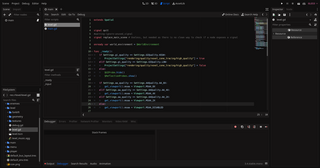Cross Platform Component Object Model (XPCOM) is a cross-platform component model from Mozilla. It is similar to Microsoft Component Object Model (COM) and Common Object Request Broker Architecture (CORBA). It features multiple language bindings and interface description language (IDL) descriptions; thus programmers can plug their custom functions into the framework and connect it with other components.
In computing, cross-platform software is computer software that is designed to work in several computing platforms. Some cross-platform software requires a separate build for each platform, but some can be directly run on any platform without special preparation, being written in an interpreted language or compiled to portable bytecode for which the interpreters or run-time packages are common or standard components of all supported platforms.
An interface description language or interface definition language (IDL), is a generic term for a language that lets a program or object written in one language communicate with another program written in an unknown language. IDLs describe an interface in a language-independent way, enabling communication between software components that do not share one language, for example, between those written in C++ and those written in Java.

The Microsoft Windows Script Host (WSH) is an automation technology for Microsoft Windows operating systems that provides scripting abilities comparable to batch files, but with a wider range of supported features. This tool was first provided on Windows 95 after Build 950a on the installation discs as an optional installation configurable and installable by means of the Control Panel, and then a standard component of Windows 98 and subsequent and Windows NT 4.0 Build 1381 and by means of Service Pack 4. The WSH is also a means of automation for Internet Explorer via the installed WSH engines from IE Version 3.0 onwards; at this time VBScript became means of automation for Microsoft Outlook 97. The WSH is also an optional install provided with a VBScript and JScript engine for Windows CE 3.0 and following and some third-party engines including Rexx and other forms of Basic are also available.

WebObjects was a Java web application server and a server-based web application framework originally developed by NeXT Software, Inc.
The Simplified Wrapper and Interface Generator (SWIG) is an open-source software tool used to connect computer programs or libraries written in C or C++ with scripting languages such as Lua, Perl, PHP, Python, R, Ruby, Tcl, and other languages like C#, Java, JavaScript, Go, D, OCaml, Octave, Scilab and Scheme. Output can also be in the form of XML.

The FOX toolkit is an open-source, cross-platform widget toolkit, i.e. a library of basic elements for building a graphical user interface (GUI). FOX stands for Free Objects for X.

Component-based software engineering (CBSE), also called component-based development (CBD), is a branch of software engineering that emphasizes the separation of concerns with respect to the wide-ranging functionality available throughout a given software system. It is a reuse-based approach to defining, implementing and composing loosely coupled independent components into systems. This practice aims to bring about an equally wide-ranging degree of benefits in both the short-term and the long-term for the software itself and for organizations that sponsor such software.
In programming and software design, binding is an application programming interface (API) that provides glue code specifically made to allow a programming language to use a foreign library or operating system service.
In Microsoft Windows applications programming, OLE Automation is an inter-process communication mechanism created by Microsoft. It is based on a subset of Component Object Model (COM) that was intended for use by scripting languages – originally Visual Basic – but now is used by several languages on Windows. All automation objects are required to implement the IDispatch interface. It provides an infrastructure whereby applications called automation controllers can access and manipulate shared automation objects that are exported by other applications. It supersedes Dynamic Data Exchange (DDE), an older mechanism for applications to control one another. As with DDE, in OLE Automation the automation controller is the "client" and the application exporting the automation objects is the "server".
Apache Tuscany was an open-source software project for developing and running software applications using a service-oriented architecture (SOA).
Thrift is an interface definition language and binary communication protocol used for defining and creating services for numerous programming languages. It was developed at Facebook for "scalable cross-language services development" and as of 2020 is an open source project in the Apache Software Foundation.
In computer science, marshalling or marshaling is the process of transforming the memory representation of an object into a data format suitable for storage or transmission. It is typically used when data must be moved between different parts of a computer program or from one program to another.

A scripting language or script language is a programming language that is used to manipulate, customize, and automate the facilities of an existing system. Scripting languages are usually interpreted at runtime rather than compiled.

Apache Pivot is an open-source platform for building rich web applications in Java or any JVM-compatible language. It is released under the Apache License version 2.0.

LibreLogo is an integrated development environment (IDE) for computer programming in the programming language Python, which works like the language Logo using interactive vector turtle graphics. Its final output is a vector graphics rendition within the LibreOffice suite. It can be used for education and desktop publishing.





